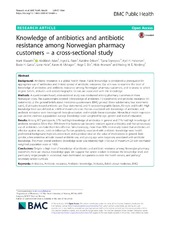Knowledge of antibiotics and antibiotic resistance among Norwegian pharmacy customers – a cross-sectional study
Waaseth, Marit; Adan, Abdifatah; Røen, Ingrid L.; Eriksen, Karoline; Stanojevic, Tijana; Halvorsen, Kjell H.; Garcia, Beate Hennie; Holst, Lone; Ulshagen, Karen Marie; Blix, Hege Salvesen; Ariansen, Hilde Louise; Nordeng, Hedvig Marie Egeland
Peer reviewed, Journal article
Published version

Åpne
Permanent lenke
https://hdl.handle.net/1956/19866Utgivelsesdato
2019-01-15Metadata
Vis full innførselSamlinger
Originalversjon
https://doi.org/10.1186/s12889-019-6409-xSammendrag
Background: Antibiotic resistance is a global health threat. Public knowledge is considered a prerequisite for appropriate use of antibiotics and limited spread of antibiotic resistance. Our aim was to examine the level of knowledge of antibiotics and antibiotic resistance among Norwegian pharmacy customers, and to assess to which degree beliefs, attitudes and sociodemographic factors are associated with this knowledge. Methods: A questionnaire based, cross-sectional study was conducted among pharmacy customers in three Norwegian cities. The questionnaire covered 1) knowledge of antibiotics (13 statements) and antibiotic resistance (10 statements), 2) the general beliefs about medicines questionnaire (BMQ general) (three subdomains, four statements each), 3) attitudes toward antibiotic use (four statements), and 4) sociodemographic factors, life style and health. High knowledge level was defined as > 66% of maximum score. Factors associated with knowledge of antibiotics and antibiotic resistance were investigated through univariate and multiple linear regression. Hierarchical model regression was used to estimate a population average knowledge score weighted for age, gender and level of education. Results: Among 877 participants, 57% had high knowledge of antibiotics in general and 71% had high knowledge of antibiotic resistance. More than 90% knew that bacteria can become resistant against antibiotics and that unnecessary use of antibiotics can make them less effective. Simultaneously, more than 30% erroneously stated that antibiotics are effective against viruses, colds or influenza. Factors positively associated with antibiotic knowledge were health professional background, high education level, and a positive view on the value of medications in general. Male gender, a less restrictive attitude toward antibiotic use, and young age were negatively associated with antibiotic knowledge. The mean overall antibiotic knowledge score was relatively high (15.6 out of maximum 23 with estimated weighted population score at 14.8). Conclusions: Despite a high level of knowledge of antibiotics and antibiotic resistance among Norwegian pharmacy customers, there are obvious knowledge gaps. We suggest that action is taken to increase the knowledge level, and particularly target people in vocational, male dominated occupations outside the health service, and primary/secondary school curricula.
Utgiver
BioMed CentralTidsskrift
BMC Public HealthOpphavsrett
Copyright 2019 The Author(s)Beslektede innførsler
Viser innførsler beslektet ved tittel, forfatter og emneord.
-
Bridging the evidence gap for implementing antibiotic stewardship in Norway: Interventions, process measures and patient outcomes related to antibiotic prescribing in hospitals
Wathne, Jannicke Slettli (Doctoral thesis, 2019-12-09)Background: Antimicrobial resistance is a major challenge for patient safety worldwide, as a growing number of infections become difficult to treat and the advances made in modern medicine are threatened. Overuse and misuse ... -
Identifying targets for antibiotic stewardship interventions through analysis of the antibiotic prescribing process in hospitals - a multicentre observational cohort study
Wathne, Jannicke Slettli; Skodvin, Brita; Charani, Esmita; Harthug, Stig; Blix, Hege Salvesen; Nilsen, Roy Miodini; Kleppe, Lars Kåre Selland; Vukovic, Marta; Smith, Ingrid (Journal article; Peer reviewed, 2020)Background: In order to change antibiotic prescribing behaviour, we need to understand the prescribing process. The aim of this study was to identify targets for antibiotic stewardship interventions in hospitals through ... -
Molecular characterization of antibiotic resistant bacteria in newly HIV diagnosed adults in a community setting in Tanzania. Implications for infection prevention and control in HIV : Antibiotic resistant bacteria, HIV, Community, Sub-Saharan Africa
Manyahi, Joel (Doctoral thesis, 2022-08-26)Mennesker som lever med HIV-infeksjon i utviklingsland har økt risiko for å bli smittet med antibiotikaresistente bakterier. Høyere forbruk av antibiotika på grunn av HIV-relatert sykdom gir et seleksjonspress som kan føre ...
